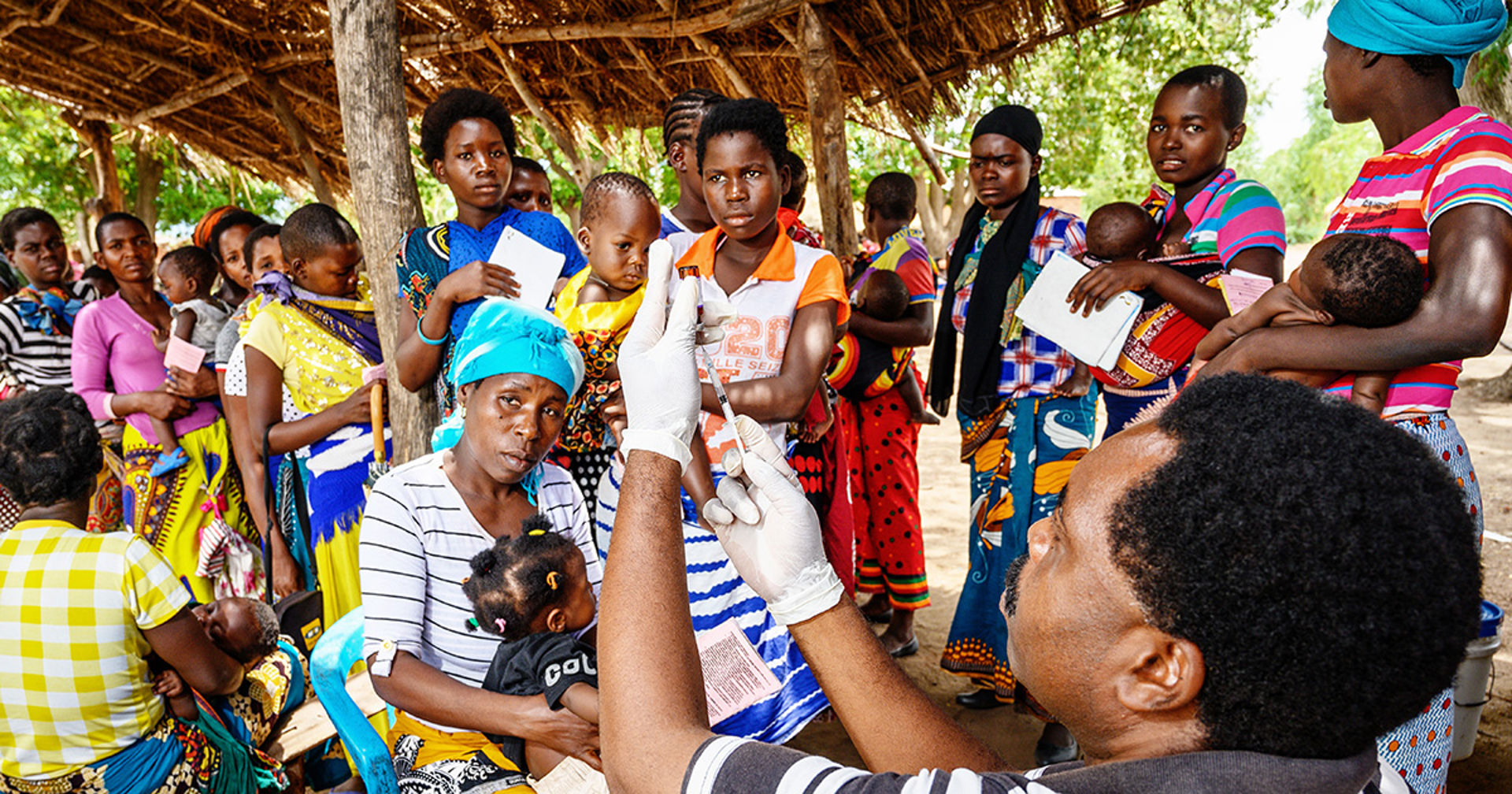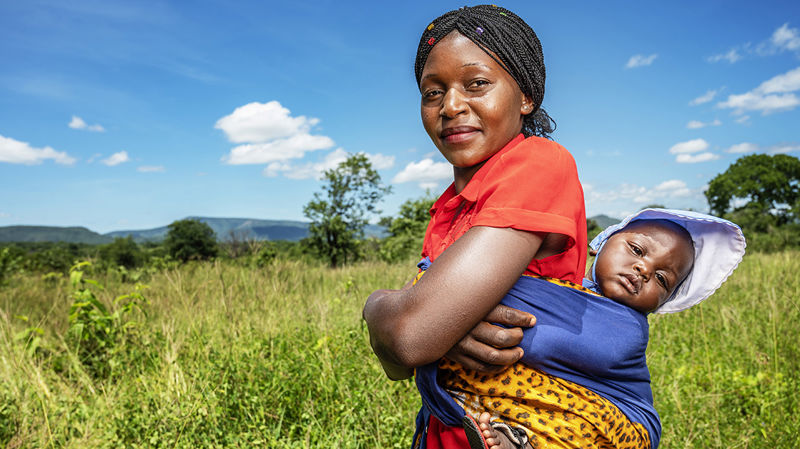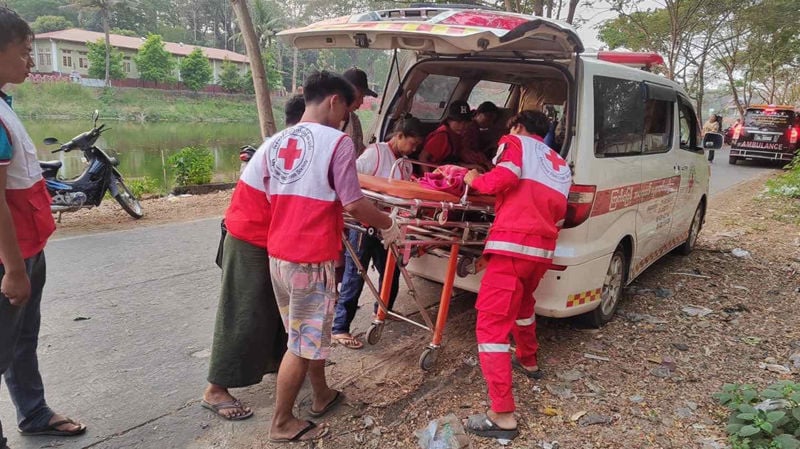Health is a common cause for the entire village

Mothers and children are healthier and people receive clean water in Malawi.
In the morning, Enelles Daud, 32, wrapped her 11-month-old son in a sling and hopped on her bicycle. It was time to take the child to be vaccinated at the mobile clinic that had arrived in the village of Chikata.
“Nowadays, the clinic comes closer to our home. I can cycle the four kilometres there in half an hour,” Enelles says happily. She knows the way well, since this is the seventh time she is visiting the clinic with her firstborn.
In addition to being vaccinated, the child is weighed and his health is monitored. Enelles also receives the necessary vaccinations at the clinic intended for children under 5 years of age and their mothers. All health information is marked on personal cards.
“The volunteers and nurses at the clinic provide useful information about health issues. If my child is ill, I can also get medicine from the clinic,” Enelles praises.
Message conveyed through a play
Customers at the clinic are also offered factual entertainment. First, a dance performance encourages family planning: it is hoped that through the power of dance, a newborn baby will receive enough time and space to grow before the family has another child.
After the dance comes a short play, where a husband, ignorant of health issues and with a reluctant attitude to vaccinations and contraception, is convinced with facts. At the end of the intense dramatic piece, he understands why it is important for his wife to spend a couple of hours a month with the baby at the mobile clinic.
Volunteers helping nurses
The clinic has two professional nurses hired by the authorities and three volunteers from the Malawian Red Cross. Aisha Maganga, 37, has been volunteering here for two years.
“I help the nurses with weighing the children. Today, we weighed 160 kids. After the clinic visit, I give the health cards back to the mothers,” Aisha says.
“I decided to become a volunteer when our village head told us about the clinic needing help. The Red Cross trained me for this task.”
After being weighed, the mothers and children move on to the vaccination queue. The vaccination programme of the clinic was complemented last spring with an important new addition. As the first of three African countries, Malawi started malaria vaccinations for children under 2 years of age in April.
Waiting for her turn in the slowly moving queue is 20-year-old Agnes Usman together with her 10-month-old son Muza.
“This clinic is a good place. I can get information and medicine if my child gets ill. It is quite far away from our home, though, as the journey takes a couple of hours,” Agnes comments.
She is at the clinic for the fourth time with her firstborn. Agnes has a clear view of her personal family plan.
“We are going to have four children,” she says without hesitation.
Food and care for children
In Malawi, the health and well-being of children is promoted in day care centres, where volunteers care for and play with 2–6-year-olds.
“We teach children new skills with the help of songs, games and stories. The children are eager to learn numbers and letters, while the older ones also learn reading and English,” explains Mary Nyongo, one of the day care centre managers in the village of Galatiya.
At best, the centre gathers together around 200 children each day. During the wet season, the number often drops to less than half due to the overflowing river nearby that makes it difficult for many to reach the centre.
“In the Red Cross training, I learned different ways of playing with children, such as how to teach children through songs,” Mary explains.
According to Mary, the skills learned at the day care centre help the children do better at school. The daily meal is an important part of the schedule.
“Many children receive better nutrition here than at home. Varied food and exercise make the children stronger,” she evaluates. The carers keep in touch with the parents and bring up their observations of the children as needed. For many parents, the centre offers a welcome break from childcare.
“The parents are truly grateful for being able to concentrate on their own work while their children are well looked after here,” Mary points out. She often brings her 2-year-old grandchild Hopekin along to the care centre.
Junior Felixson, 3, spends most of his weekdays at the day care centre, as all of his four siblings have done before him. Junior’s family is at times short of food, and he does not hesitate in picking his favourite thing about the care centre.
“The porridge is good here,” Junior comments. He has already learned new skills and is currently working on an important project.
“I have been learning numbers,” Junior reveals. His mother Jennifer is happy with the care her child receives.
“It is great that Junior can grow and develop here by playing with the other children. I know from experience what a good thing this is for children,” Jennifer praises.
For the time being, the children in the Galatiya care centre gather outdoors, since the old building has leaks and is unsafe for children. Children are often sent home when it rains. However, the new building is already being constructed, and in a few months the children and their carers will have new and safe facilities.
The children’s day care centre is run by volunteer carers, who arrange activities for the children, as well as volunteers from the parents’ committee, who cook food and take care of other practical matters. The Malawian Red Cross trains volunteers and offers food and kitchen supplies as well as seeds to be sown in the garden of the day care centre.
Investing in cleanliness pays off
Clean water and hygiene are essential elements in promoting the health of village communities. Three years ago, the Malawian Red Cross launched the concept of the clean village.
“The title of a clean village is awarded to villages where 80 per cent of households meet certain criteria. For example, houses must have a proper toilet with hand washing facilities, a washing line, a proper bin for waste and a place to dry dishes,” lists Peter Banda, employee of the Mangochi district of the Malawian Red Cross.
A clean village must also have a volunteer trained by the Red Cross, who helps and advises families but also reports on any shortcomings. If some family slips from the set requirements, the village committee can issue a penalty payment.
Resident of the Ussi clean village, Ethel Medson, 40, is happy with the increased cleanliness and hygiene.
“Before, our children would often suffer from diarrhoea or other illnesses, and their schooling suffered. They are now much healthier,” Ethel mentions. She thinks that it is a good thing that the cleanliness of the village is controlled.
“If I keep my environment clean, but my neighbour is indifferent, I can get a disease from there.”
One important factor promoting health and quality of life is the well built in the village by the Red Cross.
“Before, the trip to get water with all the waiting could take up to six hours. Now, the well is so close that my 7-year-old daughter Sidhat sometimes helps me fetch water with her small bucket,” Ethel praises.
Thanks to the improved water situation, just like Ethel, most villagers have established their own garden with the support of the Red Cross. It improves their food security and provides variety to their diet.
“I farm okra, pumpkin, mustard and bonongwe. Farming in the home garden is easier now that we are less dependent on the rainy seasons.”
Well brings health
During the dry season, the Mwanamulanje River has dried up to a hardly noticeable stream. Even so, the stream is busy as dozens of women and girls from the nearby village have come to fetch water for their homes.
11-year-old Bethia Chapwera has ladled her large green water pail full and begins to carry the heavy load home a couple of hundred metres away. The water is clear and looks clean, but looks can be deceiving.
“The 250 families in the village use the water for drinking and cooking. This has caused a lot of illness. For example, in the past three months, over a hundred children under 5 years of age were afflicted with diarrhoea,” states local health authority Dominic Maloto.
The villagers’ quality of life will improve significantly when the well built by the Malawian Red Cross becomes available for two villages. It will offer safe drinking water for over two thousand people.
“Soon, we can finally abandon this water supply point, and these families can enjoy clean water,” Dominic rejoices.

Development cooperation
